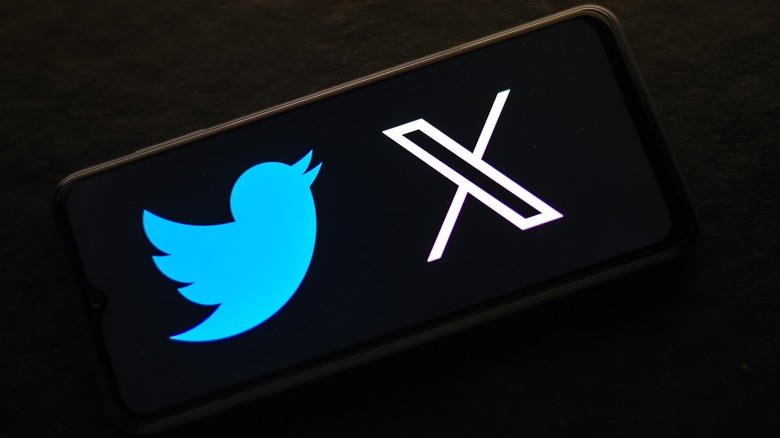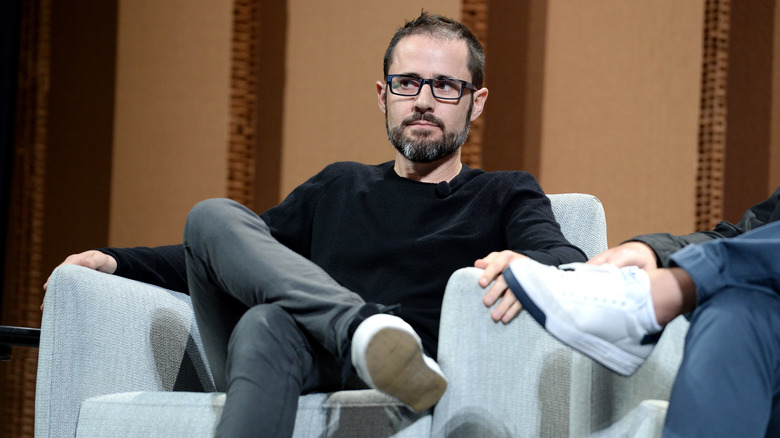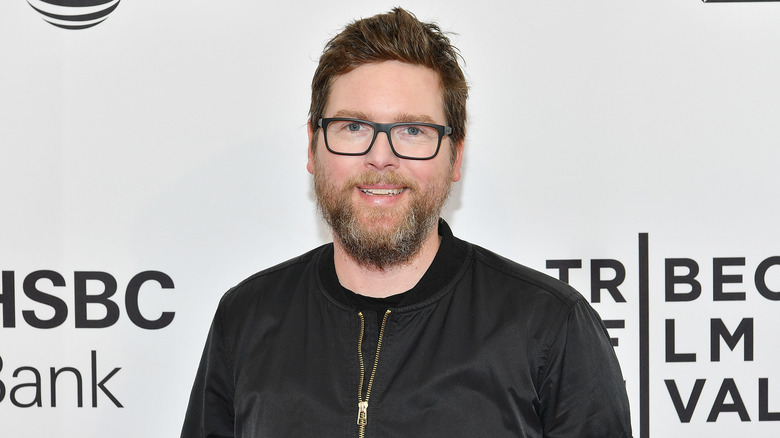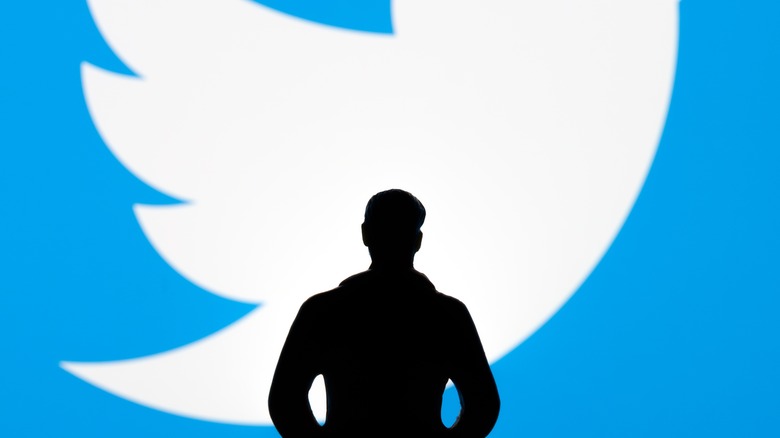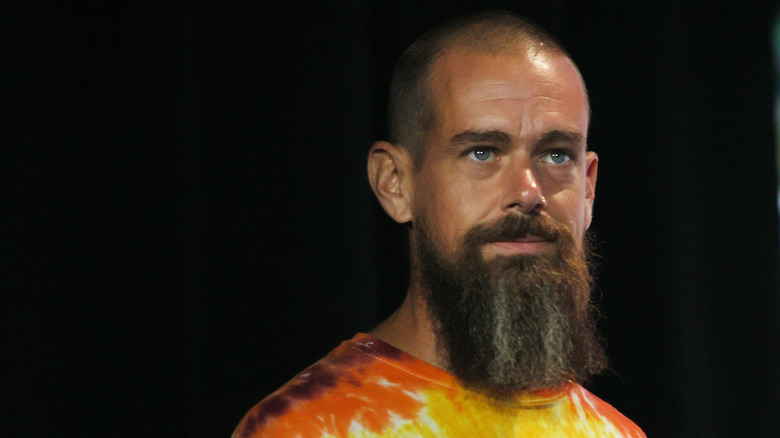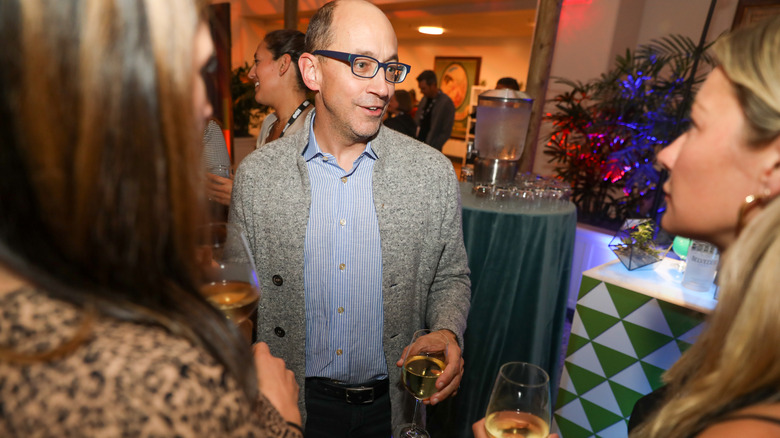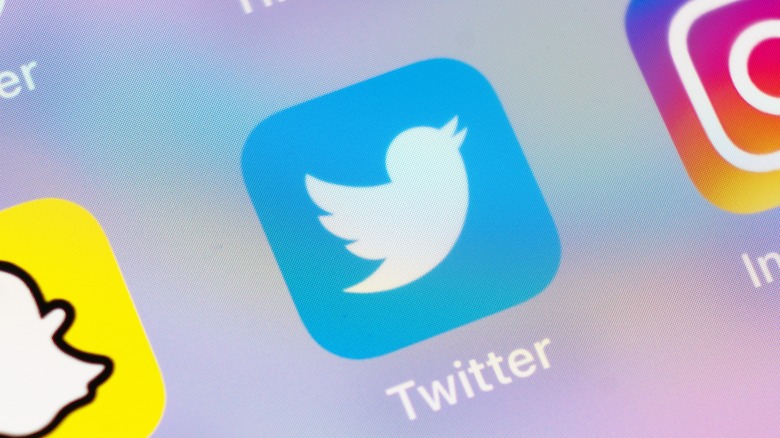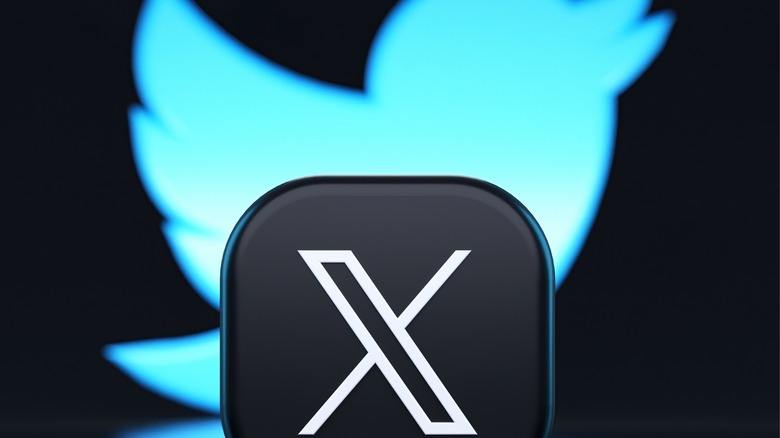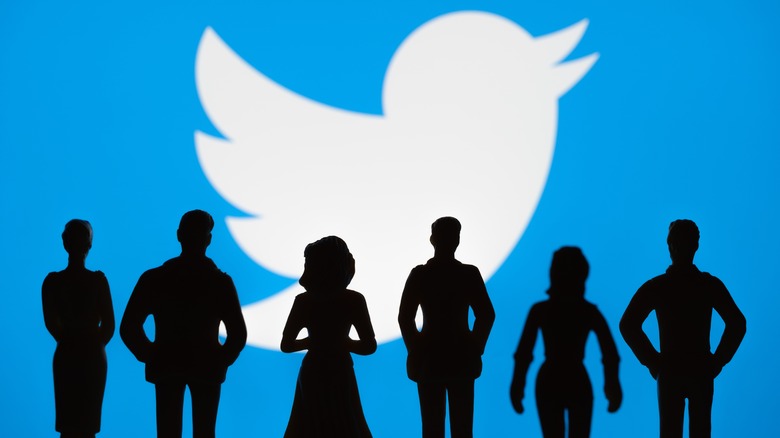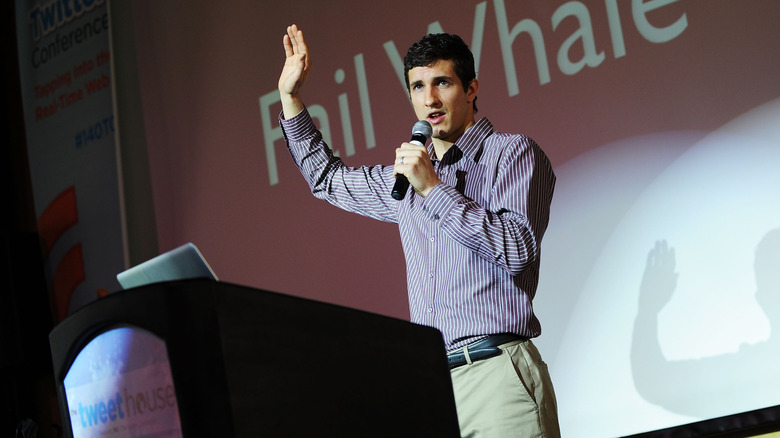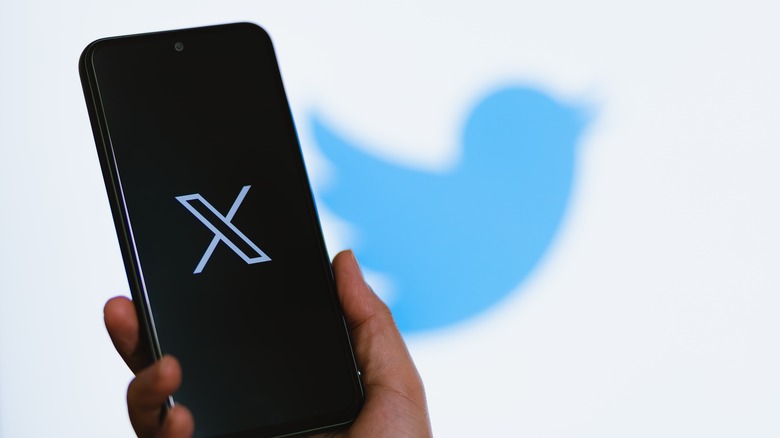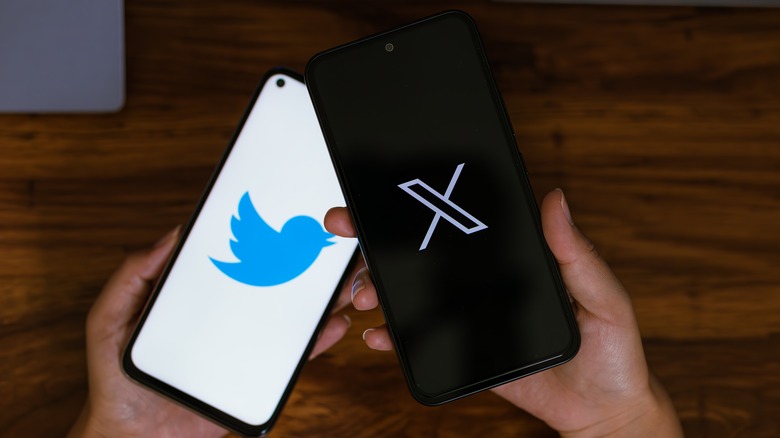Whatever Happened To Twitter's First Employees?
X, the social network formerly known as Twitter, is one of the biggest websites on the Internet. According to Pew Research, Twitter currently ranks in the top 10 of social media platforms, wedged between Snapchat and Reddit in terms of popularity, and is among the most viewed websites in the world.
Twitter was launched in 2006 by Evan Williams, Biz Stone, and Noah Glass. Initially, the trio came together in 2004 to create a podcasting company called Odeo. Williams and Stone were former Google employees, while Williams was the mind behind Blogger. Once Apple integrated podcasts into iTunes in 2005, the trio decided to take the company in another direction since they likely couldn't compete with Apple. Leadership asked the staff about any side projects they were working on, and engineer Jack Dorsey proposed the idea that would eventually become Twitter — although it was first known as Twttr.
Experts have credited Twitter with helping to shape the Internet as we know it today. Twitter helped bring politicians onto social media and the service is even seen as an important part of Barack Obama's successful 2008 U.S. presidential campaign. The site couldn't have gotten where it is today without a range of important people, and we're going to talk about what they've been up to since they worked at Twitter.
Evan 'Ev' Williams
Evan Williams is one of Twitter's original employees. He started Odeo with Biz Stone and Noah Glass and helped oversee the company's pivot from podcasts to social networking in the mid-2000s. Before Twitter, Evan is credited with launching Blogger in 1999. Google would go on to eventually buy Blogger in 2003, where Williams worked until 2004.
Once Twitter launched, Williams took on a leadership role as chairman of the board. He eventually succeeded Jack Dorsey as CEO in 2008 before stepping back down to board member in 2010 and handing off the reins to Dick Costolo. Williams took a break from Twitter for a while to start up other companies. One of these, Medium, became another major success story in the blogging space. Williams would remain on Twitter's board until 2019 while serving as Medium's CEO simultaneously.
After leaving Twitter, Williams co-founded Obvious Ventures with James Joaquin and Vishal Vasishth in 2014. The company is a venture capital firm that specializes in investing in early-stage startups. A few years later, Williams gave up his CEO role at Medium to Tony Stubblebine, who once worked with Williams as the VP of Engineering at Odeo before it became Twitter. Today, Williams is still a chairman at Medium and retains his role at Obvious Ventures.
Biz Stone
Biz Stone is another important name in the world of blogging. Before Twitter, Stone worked as the creative director at Xanga, a social blog platform where users could follow each other and write blog posts. Evan Williams tempted Stone away to work at Blogger shortly after it had been purchased by Google and left the company with Williams in 2004 to form Odeo. Once Twitter launched, Stone became the creative director for the company. He would step down from Twitter in 2011.
His business partnership with Evan Williams would continue after Twitter. He also had a hand in founding Medium alongside Williams where he would also remain as the chief creative officer until 2013. In 2013, Stone co-founded and became CEO of Jelly, a search engine combined with a Q&A platform. Jelly eventually sold to Pinterest in 2017 with Pinterest making Stone a special advisor. Jelly was far from Stone's best idea, but Pinterest was still interested in keeping the team around after the acquisition.
Stone returned to Twitter in 2017 for a brief time. Amusingly, Stone wrote on Medium that his goal was to "guide the company culture, that energy, that feeling ... You might even say the job description includes being Biz Stone." While he no longer works for Twitter, Stone remains an advisor to handful of other Internet companies. Most recently, he joined up with Mastodon, which is a noted rival of X.
Noah Glass
Noah Glass isn't the most visible member of the founder group that created Twitter, but he was a key part of the trio that founded Odeo and eventually Twitter. Before that, Glass worked at Industrial Light and Magic, a visual effects studio that works for motion picture studios. Glass joined the duo in forming Odeo and, later, Twitter. In an interview with Business Insider, Glass says that he helped form Twitter in the early days as much as anyone else and believed heavily in the Twitter vision. According to some accounts, Glass was the one actually in charge of getting Twitter off the ground and even came up with the original name — Twttr.
However, Glass was fired shortly after Twitter officially launched in 2006. According to Ev Williams, Jack Dorsey asked Williams to fire Glass, but according to Dorsey, Williams asked if Glass should be fired, and Dorsey agreed that he should. Regardless, Glass exited the company fairly early on with an unknown amount of stocks and cash. Glass doesn't appear to hold a grudge, as he tweeted a congratulations to the Twitter crew in 2013 when the company went public.
These days, Glass keeps an intentionally low profile, and hasn't been heard of much in the tech space or otherwise since he wished the team at Twitter his congratulations.
Jack Dorsey
Jack Dorsey is arguably the most public figure in Twitter's history. Before Twitter, Dorsey worked on software for taxi dispatching services that eventually evolved to handle emergency vehicles and couriers as well. He was one of the first employees of Odeo, where he pitched the idea that would eventually become Twitter. As a result, he ended up being the company's first CEO until 2008, at which point Ev Williams took over the CEO role and Dorsey became chairman of the board. There, he helped with Twitter's IPO, which raised $1.8 billion for the company.
Dorsey returned to helm Twitter in 2015 where he stayed until his eventual permanent departure in 2021. He faced equal parts criticism and praise for his removal of Donald Trump from the platform in 2020. Upon his 2021 exit, he posted his resignation letter on Twitter, where he said that being a founder-led company was severely limiting for the platform. He passed the reigns onto Parag Agrawal, who had a tough time running Twitter before Musk bought it in 2022.
In addition to Twitter, Dorsey is linked to several other high-end business endeavors. He founded Square, the payment platform used by many small businesses. It was rebranded as Block in 2021 and Dorsey remains in charge of it to this day. He also became a member of the Disney Company board of directors in 2013 and stayed until 2018. Dorsey was also joined the board of Bluesky – another Twitter rival – before leaving in early 2024.
Dick Costolo
Dick Costolo wasn't exactly one of the earliest employees of Twitter, but he was the first CEO of the company whose name wasn't Jack Dorsey or Ev Williams. Before joining Twitter in late 2009, Costolo was a product manager at Google. He wound up there when the prior company he worked for, Feedburner, was purchased by Google for $100 million in 2007. When he joined, he succeeded Ev Williams as CEO and ran the company through some of the most important moments of its history.
Under Costolo, Twitter went from being a startup to being a full-fledged business. He oversaw the IPO in 2013 and when he left in 2015 the company's reported revenue was north of $2 billion. In other words, the former leadership birthed Twitter, but Costolo helped it grow into the company it is today. Eventually, Wall Street and other people began questioning Costolo, who got sick of the criticism and eventually stepped down. After his exit, Jack Dorsey came back as interim CEO before accepting the role in its entirety for the next six years.
The former Twitter CEO would not sit around for very long. He co-founded 01 Advisors, a venture capital and private equity firm, with Adam Bain in 2018 where he remains a managing partner to this day. He's also been linked to some other companies that never quite made it off the ground, such as a fitness software setup that was talked about in 2016 but never came to fruition.
Blaine Cook
Blaine Cook doesn't get the same accolades heaped on other early Twitter employees, but he was right there when the action started. He started his career at Twitter the same way as most early members — by working at Odeo. When Dorsey pitched the Twitter idea, Cook was part of the project that started it and he worked on the project as a founding engineer. He is even among the first 500 people to ever have a Twitter account.
According to an interview with Nelson Star, Cook said that he pitched an idea for Twitter to become decentralized and allow people to post and interact with posts on other social networks. The idea flatlined in 2008 and Cook was eventually let go. Eventually, when Musk took over Twitter and users began flocking to Mastodon, Cook said that it felt "like 14 years of vindication all at once."
Fortunately, Cook has remained busy since his exit from Twitter. He worked at Yahoo! Brickhouse for a time before moving on to BT and OAuth. He founded Poetica, a real-time content editing system, which was eventually purchased by Conde Nast in 2016. Cook then went to work for Conde Nast until 2022. Today, Cook works as a principal engineer at Fission, a company that developers an open source serverless framework.
Tim Roberts
Tim Roberts is also among the Twitter originals. Roberts has one of first accounts ever made on Twitter, which means he was there at the very beginning. Before Odeo and Twitter, Roberts worked at a handful of jobs, including Yahoo!, and he joined Odeo to help with product management and marketing until left the organization in 2006.
Roberts would land a job at Fitbit and eventually worked his way up to executive vice president of product and design. While there, he had influence over Fitbit's product management, UX design, and he worked on the mobile and web apps. He would eventually leave the company in 2017 during a personnel shakeup. Fitbit had just announced a poor 2016 financial year and restructured the company to better focus on a different strategy.
Roberts would have one more full-time job as at Eventbrite's research and development incubator before going becoming an advisor and investor for a number of different companies, including Rise Science, WayBetter, Wondr Health, and others in a self-employed capacity.
Evan (Rabble) Henshaw-Plath
Evan (Rabble) Henshaw-Plath has a unique distinction at Twitter. Not only was he one of the first accounts on the platform but he was, for a period of time, Jack Dorsey's boss. Rabble held that distinction back when everybody still worked at Odeo, although Dorsey passed him up when he was put in charge of the Twitter project. Rabble was also responsible for the hiring of Blaine Cook. Like Cook, Rabble really liked the idea of Twitter becoming a decentralized platform and Twitter going the other way with it likely contributed to his early exit in 2006.
Since his exit from Twitter, Rabble has been a busy man. He worked for Yahoo! for a little while and did some independent consulting in the intervening years. There was even a period of time where Rabble taught at MIT in Comparative Media Studies. Eventually, however, Rabble ended up as the CEO of Nos. Nos is a decentralized social network that bills itself as a "healthy social network" that is a client for people as opposed to algorithms. Given his work history and enjoyment of decentralized social media, that seems like a fitting spot for Rabble to end up.
In addition, Rabble is an activist and spent time doing some work for Indymedia, a publishing service for activist journalists. He's was not active at all on Twitter or X after his departure, but you can find him posting about a bunch of stuff on his Nos profile.
Dom Sagolla
Dom Sagolla was also part of the initial team that built Twitter. Like most of his colleagues, Sagolla was successful before his time at Odeo and Twitter. He worked at Adobe for two years, and preceding that was a stint teaching at the University of California at Berkeley. He also had stops at Hewlett Packard and MIT Media Lab before joining the Twitter crew. While at Twitter, Sagolla was part of the team that pitched the idea, helping to oversee Twitter as it was being created, tested, and deployed.
Sagolla is a big fan of the 140-character limit on Twitter and even wrote a book called "140 Characters" about how to effectively write in such a short format. Like most of Twitter's early employees, Dom's position was eliminated, and he was sent packing — an anticlimactic end for one of the first ten people ever on Twitter. Thankfully, Sagolla soon went back to Adobe to work as a lead quality engineer while also developing DollarApp, an endeavor he eventually sold to Chaotic Moon Studios in 2012. He kept working with Chaotic Moon Studios for another two years before leaving to do other things.
On top of teaching people how to win hackathons through posts on his Medium account, Sagolla has co-founded and currently helps run three different companies. One is Developer Camp, a learning spot for young developers. Additionally, Sagolla co-founded Kryptonic and Archipelo, both of which deal with AI, the blockchain, and more.
Crystal Taylor
Crystal Taylor's long career with the brand makes her arguably the most impressive member of this entire list. Before Twitter, Crystal worked at various companies as a customer service representative, and she joined Odeo in 2005 as a customer support specialist. She eventually moved up to customer support manager and — as of this writing — Crystal still works at X.
Of the early employees we found, Crystal appears to be the only one who survived the transition from Odeo to Twitter and then from Twitter to X. That alone is a feat impressive enough to brag about given how many people dropped off along the way and how divisive the social network has become. Crystal says on her LinkedIn that she's made lifelong friends at her job and that she loves it. Genuinely, good for her — it's difficult to work at any tech company for nearly 20 years, let alone one with a history as tumultuous as X.
Florian Weber
Florian Weber doesn't just have a really cool name — he was also instrumental in Twitter's early days. His career started innocently enough as a freelance software developer working in PHP, Java, and Ruby on Rails. It was the latter that nabbed Weber a job at Odeo and, eventually, Twitter. According to Weber's LinkedIn, he helped Jack Dorsey build the first version of Twitter. Secondary accounts back up Weber's claims as he is credited with a lot of the early coding efforts for the social network.
Unfortunately, the German programmer's early efforts would ultimately be for naught. Twitter hired him as a contractor, which prevented him from getting any stock like most employees did. Reportedly, he didn't push very hard for it and didn't mind much that he didn't get any stock. In fact, Weber actually exited on his own after he became tired of telecommuting from Hamburg. After his departure, Weber founded Amen, a centralized service for truck drivers, which he eventually sold to Tape.TV. Weber would stick around at Tape.TV for another year before striking off to do other things.
Weber eventually returned to freelance work as a product engineer focusing on helping teams build new products just like he did at Twitter. He also puts in time as a mentor at the Berlin Founders Fund. Also, unlike many of the old guard, Weber still uses X actively.
